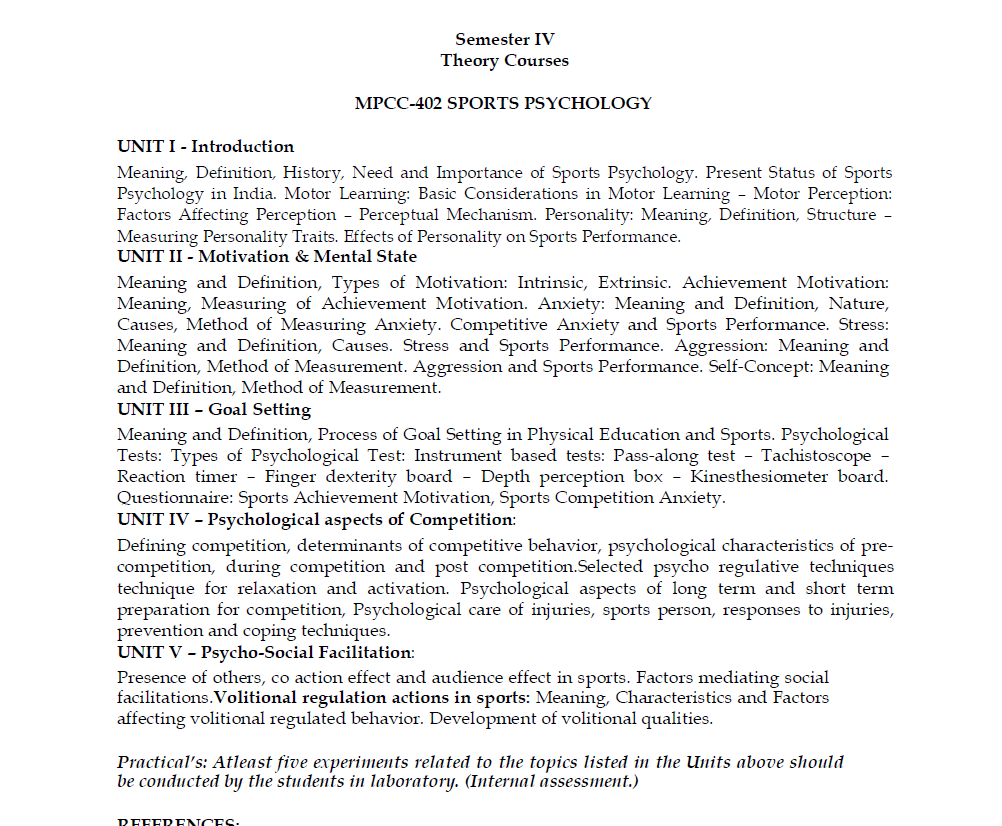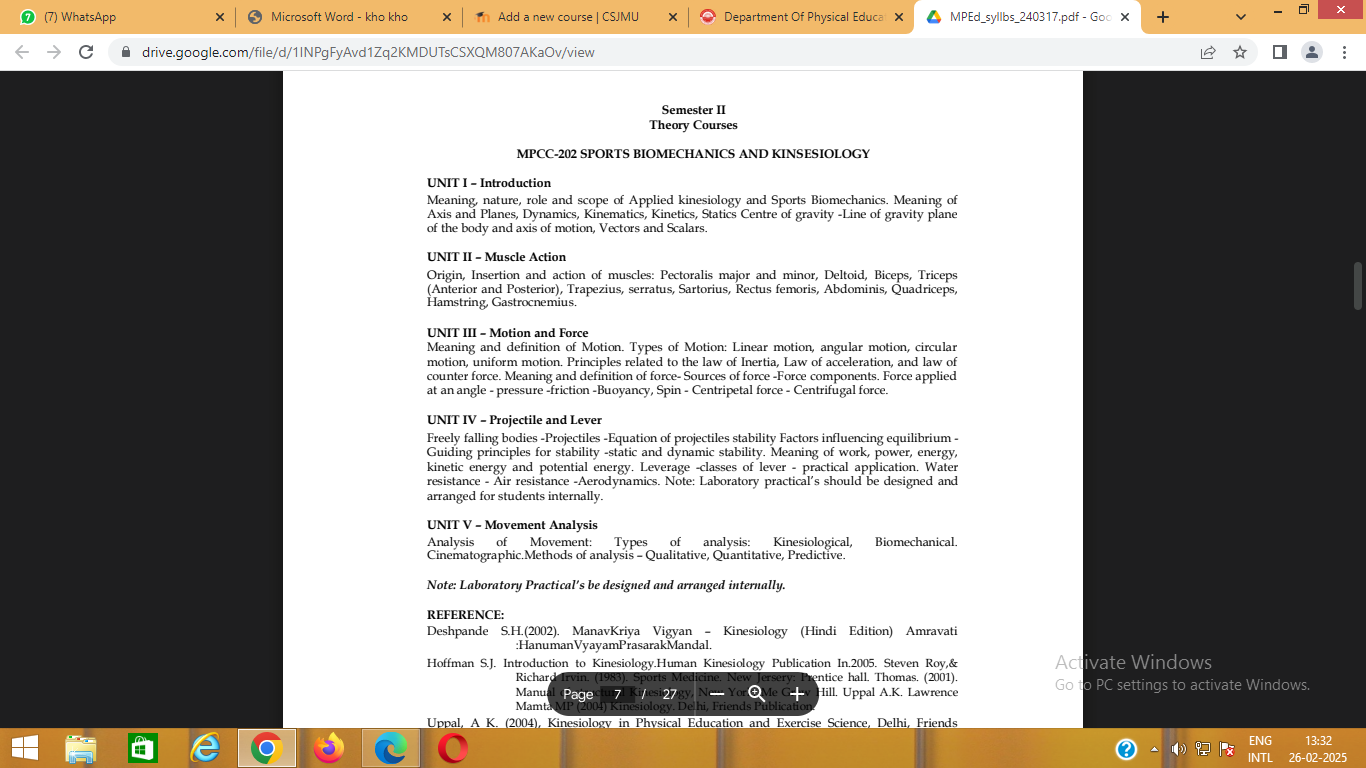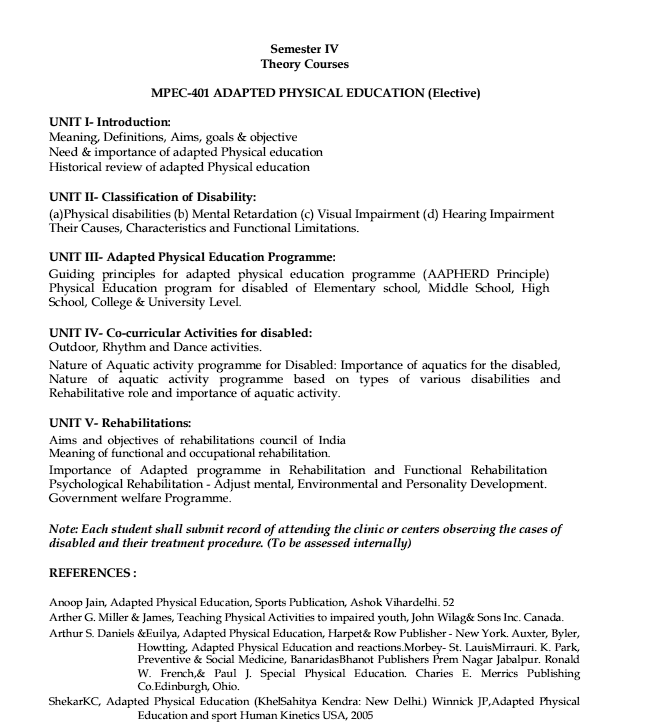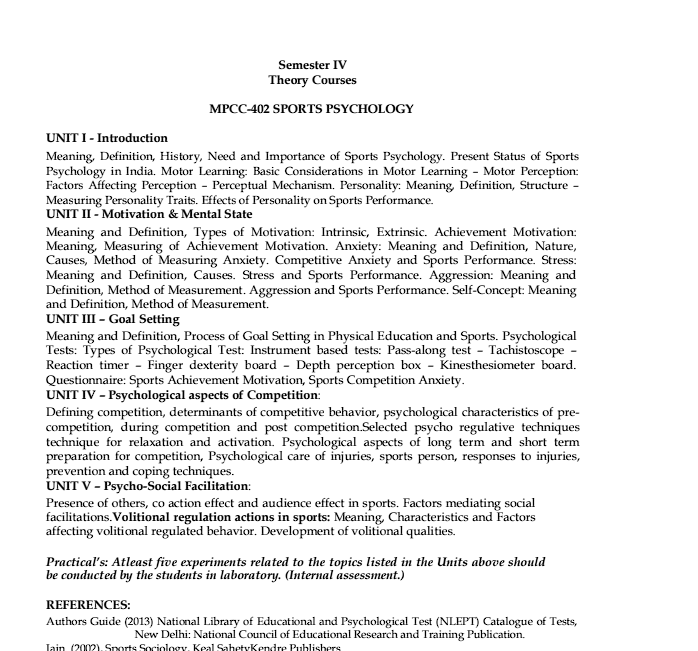
COURSE OBJECTIVES:
1. To understand the ever evolving curriculum of physical education
2. To develop opportunities to construct & design the curriculum of PE in broader aspects realizing the age group, gender consideration and physiological basis.
STUDENT LEARNING OUTCOMES:
1. Students will be able to design need based curriculum of PE various groups.
- Teacher: Ashish Katiyar

Semester IV
Theory Courses
MPCC-402 SPORTS PSYCHOLOGY
UNIT I - Introduction
Meaning, Definition, History, Need and Importance of Sports Psychology. Present Status of Sports
Psychology in India. Motor Learning: Basic Considerations in Motor Learning – Motor Perception:
Factors Affecting Perception – Perceptual Mechanism. Personality: Meaning, Definition, Structure –
Measuring Personality Traits. Effects of Personality on Sports Performance.
UNIT II - Motivation & Mental State
Meaning and Definition, Types of Motivation: Intrinsic, Extrinsic. Achievement Motivation:
Meaning, Measuring of Achievement Motivation. Anxiety: Meaning and Definition, Nature,
Causes, Method of Measuring Anxiety. Competitive Anxiety and Sports Performance. Stress:
Meaning and Definition, Causes. Stress and Sports Performance. Aggression: Meaning and
Definition, Method of Measurement. Aggression and Sports Performance. Self-Concept: Meaning
a nd Definition, Method of Measurement.
UNIT III – Goal Setting
Meaning and Definition, Process of Goal Setting in Physical Education and Sports. Psychological
Tests: Types of Psychological Test: Instrument based tests: Pass-along test – Tachistoscope –
Reaction timer – Finger dexterity board – Depth perception box – Kinesthesiometer board.
Questionnaire: Sports Achievement Motivation, Sports Competition Anxiety.
UNIT IV – Psychological aspects of Competition:
Defining competition, determinants of competitive behavior, psychological characteristics of precompetition,
during competition and post competition.Selected psycho regulative techniques
technique for relaxation and activation. Psychological aspects of long term and short term
preparation for competition, Psychological care of injuries, sports person, responses to injuries,
prevention and coping techniques.
UNIT V – Psycho-Social Facilitation:
Presence of others, co action effect and audience effect in sports. Factors mediating social
facilitations.Volitional regulation actions in sports: Meaning, Characteristics and Factors
affecting volitional regulated behavior. Development of volitional qualities.
Practical’s: Atleast five experiments related to the topics listed in the Units above should
be conducted by the students in laboratory. (Internal assessment.)
REFERENCES:
Authors Guide (2013) National Library of Educational and Psychological Test (NLEPT) Catalogue of Tests,
New Delhi: National Council of Educational Research and Training Publication.
J ain. (2002), Sports Sociology, Keal SahetyKendre Publishers.
Jay Coakley. (2001) Sports in Society – Issues and Controversies in International Education, Mc-Craw
Seventh Ed.
John D Lauther (2000) Psychology of Coaching.NerJersy: Prenticce Hall Inc.
J ohn D. Lauther (1998) Sports Psychology. Englewood, Prentice Hall Inc.
MiroslawVauks& Bryant Cratty (1999).Psychology and the Superior Athlete. London: The Macmillan Co.
Richard, J. Crisp. (2000). Essential Social Psychology.Sage Publications.
Robert N. Singer (2001). Motor Learning and Human Performance. New York: The Macmillan Co.
Robert N. Singer. (1989) The Psychology Domain Movement Behaviour. Philadelphia: Lea and Febiger.
T helma Horn. (2002). Advances in Sports Psychology. Human Kinetic.
Whiting, K, Karman.Hendry L.B & Jones M.G. (1999) Personality and Performance in Physical Education
and Sports. London: Hendry Kimpton Publishers.
- Teacher: Abhishek Mishra


